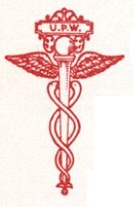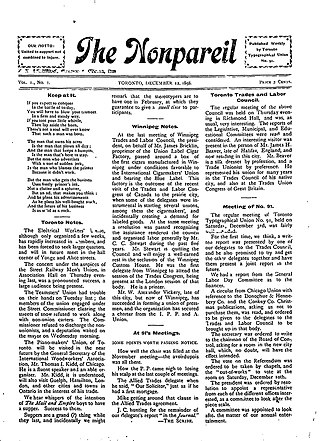Related Research Articles

The World Federation of Trade Unions (WFTU) is an international federation of trade unions established in 1945. Founded in the immediate aftermath of World War Two, the organization built on the pre-war legacy of the International Federation of Trade Unions as a single structure for trade unions world-wide, following the World Trade Union Conference in London, United Kingdom.

Manufacturing, Science and Finance was a trade union in Britain. Over eighty members of Parliament were members.

The Transport and General Workers' Union was one of the largest general trade unions in the United Kingdom and Ireland – where it was known as the Amalgamated Transport and General Workers' Union (ATGWU) to differentiate itself from the Irish Transport and General Workers' Union – with 900,000 members. It was founded in 1922 and Ernest Bevin served as its first general secretary.

The Amalgamated Engineering and Electrical Union (AEEU) was a British trade union. It merged with the MSF to form Amicus in 2001.

United Nations Security Council Resolution 678, adopted on 29 November 1990, after reaffirming resolutions 660, 661, 662, 664, 665, 666, 667, 669, 670, 674 and 677, the council noted that despite all the United Nations efforts, Iraq continued to defy the Security Council.

The Communications Workers of America (CWA) is the largest communications and media labor union in the United States, representing about 700,000 members in both the private and public sectors. The union has 27 locals in Canada via CWA-SCA Canada representing about 8,000 members. CWA has several affiliated subsidiary labor unions bringing total membership to over 700,000. CWA is headquartered in Washington, DC, and affiliated with the AFL–CIO, the Strategic Organizing Center, the Canadian Labour Congress, and UNI Global Union.

The United Steel, Paper and Forestry, Rubber, Manufacturing, Energy, Allied Industrial and Service Workers International Union, commonly known as the United Steelworkers (USW), is a general trade union with members across North America. Headquartered in Pittsburgh, the United Steelworkers represents workers in Canada, the Caribbean, and the United States. The United Steelworkers represent workers in a diverse range of industries, including primary and fabricated metals, paper, chemicals, glass, rubber, heavy-duty conveyor belting, tires, transportation, utilities, container industries, pharmaceuticals, call centers, museums, and health care.

Communications, Energy and Paperworkers Union of Canada, abbreviated CEP in English and SCEP in French, was a largely private-sector labour union with 150,000 members, active from 1992 to 2013. It was created in 1992 through the merger of three unions: the Canadian Paperworkers Union, the Communications and Electrical Workers of Canada, and the Energy and Chemical Workers Union. See below for some other unions that were merged into the CEP. CEP/SCEP was affiliated to the Canadian Labour Congress.
Robert "Bob" Huget was a politician in Ontario, Canada. He was a New Democratic Party member of the Legislative Assembly of Ontario from 1990 to 1995, and served as a cabinet minister in the government of Bob Rae.

The Union of Communication Workers (UCW) was a trade union in the United Kingdom for workers in the post office and telecommunications industries.

The Oil, Chemical and Atomic Workers Union (OCAW) was a trade union in the United States which existed between 1917 and 1999. At the time of its dissolution and merger, the International represented 80,000 workers and was affiliated with the AFL–CIO.

The Amalgamated Engineering Union (AEU) was a major British trade union. It merged with the Electrical, Electronic, Telecommunications and Plumbing Union to form the Amalgamated Engineering and Electrical Union in 1992.

The Electrical, Electronic, Telecommunications and Plumbing Union, known as the EETPU, was a British trade union formed in 1968 as a union for electricians and plumbers, which went through three mergers from 1992 to now be part of Unite the Union.
The United Paperworkers' International Union (UPIU) was a labor union representing workers involved in making paper, and later various industrial workers, in the United States and Canada.
This is a timeline of labour issues and events in Canada.
Neil Reimer was an activist, trade unionist and politician in Canada.
The Graphic Communications International Union (GCIU) was a labor union representing printing workers in the United States and Canada.

The Toronto Typographical Union (TTU) was an early Canadian trade union in the printing industry. Founded in 1832, it came to prominence in 1872 when it organized a major strike in Toronto. Membership declined in the mid- to late-20th century as printing turned digital. By 1994, TTU had been absorbed by the Communications, Energy and Paperworkers Union of Canada.
The Energy and Chemical Workers Union (ECWU) was a Canadian trade union. It was founded in April 1980 as the result of a merger of the Canadian district of the Oil, Chemical and Atomic Workers International Union, the Canadian Chemical Workers Union, and various directly chartered local unions of the Fédération des travailleurs et travailleuses du Québec. In 1992, it merged with the Communications and Electrical Workers of Canada and the Canadian Paperworkers Union to form the Communications, Energy and Paperworkers Union of Canada.
The Canadian Paperworkers' Union (CPU) was a trade union.
References
- 1 2 Directory of Labour Organizations in Canada, 1988. Labour Canada. 1988. p. 17. ISBN 978-0-660-54244-7.
- ↑ Directory of Labour Organizations in Canada, October 1989. Labour Canada. 1989. p. xvi. ISBN 978-0-662-55431-8.
- ↑ Directory of Labour Organizations in Canada, 1990/91. Labour Canada. 1990. p. xvi. ISBN 978-0-662-55431-8.
- ↑ Directory of Labour Organizations in Canada, 1992–93. Labour Canada. 1992. p. xvii. ISBN 978-0-660-57415-8.
- 1 2 "Fonds RC0163 – International Union of Electrical, Radio and Machine Workers. Canadian District". McMaster University. Retrieved 23 October 2023.
- 1 2 Gary N. Chaison (1996). Union Mergers in Hard Times: The View from Five Countries. Ithaca, New York: ILR Press. p. 74. ISBN 978-0-8014-8380-6.
- 1 2 James McCrostie (1996). Just the Beginning: The Communications, Energy and Paperworkers Union of Canada (PDF). Ottawa: Communications, Energy and Paperworkers Union of Canada. p. 25. Archived from the original (PDF) on 13 March 2014.